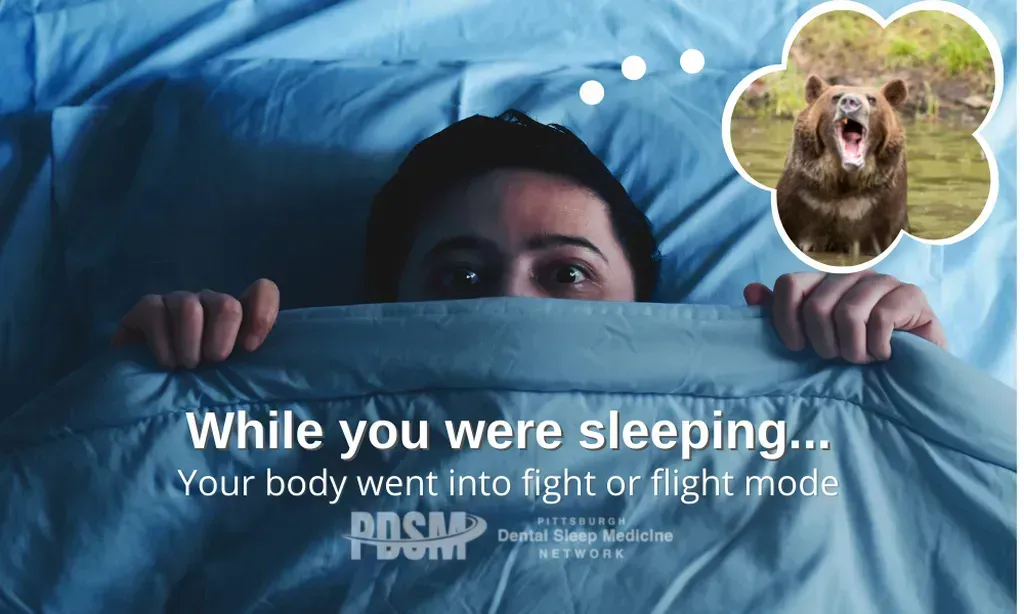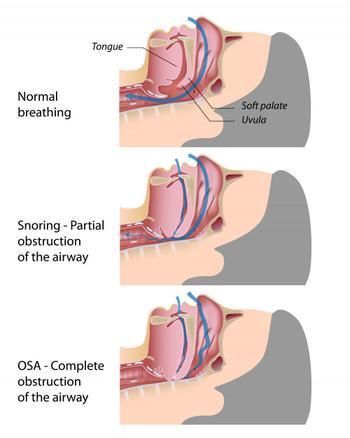Are You Running From A Bear In Your Sleep?

What would happen to your body if you encountered a bear in the middle of the woods? Your heart rate would rise, your stress hormones would increase, and your body would go into fight or flight mode. If you are not breathing properly while you sleep...
What would happen to your body if you encountered a bear in the middle of the woods? Your heart rate would rise, your stress hormones would increase, and your body would go into fight or flight mode. If you are not breathing properly while you sleep, your body responds in the same way.
WHAT'S YOUR BODY DOING WHILE YOU SLEEP?
Sleep is a time for your body to relax, your cells to regenerate, and your body to repair from the work it has done for you during the day. In people who suffer from unmanaged obstructive sleep apnea, their bodies are not given the opportunity to do this. Over time this can lead to physical conditions such as diabetes, cardiovascular disease, and dementia to name a few.
Why does obstructive sleep apnea have such a profound effect on the body's function? Let’s first discuss what happens when someone suffers from obstructive sleep apnea. As you sleep, your muscles relax, this becomes more significant as you enter the deeper stages of sleep. This relaxation occurs in the lower jaw, the tongue, and the tissues in the back of the throat.
As deeper stages of sleep occur, so does increased relaxation. In addition, as you age, your tissues lose tone, causing this relaxation to be more profound. As the tongue and lower jaw relax, they will fall back into the airway space and significantly narrow or completely close the airway.
Despite the brain signaling the body to breathe, the airway will not allow a sufficient amount of air, if any, to enter the lungs. Thus, preventing your body from receiving the oxygen it needs to function properly.

WHAT HAPPENS WHEN YOU DON'T GET ENOUGH OXYGEN?
As the body begins to realize that it is not receiving oxygen, your sleep is interrupted, consciously or unconsciously, so that your airway opens, enabling you to breathe. Breathing becomes deeper and more rapid to make up for the lack of oxygen that occurred during the narrowing or closure of the airway. The heart will beat at a rate of almost twice what it was during the airway closure. When this happens several times an hour, your body experiences stress; stress hormones are released, and the heart suffers from a cycle of beating slowly to having to beat rapidly to supply oxygen to the organs.
This continuous cycle also prevents the deeper stages of sleep from occurring. It is in the deeper stages of sleep that the body does most of its repair work, cells regenerate, and memory is stored.
LONG-TERM EFFECTS OF OBSTRUCTIVE SLEEP APNEA
Over time, the stress of trying to breathe properly during sleep will take its toll in the form of physical effects. In addition, if you are not getting into a deep sleep for an adequate amount of time, you will feel tired when you wake up despite being “asleep” for 7-8 hours. This will manifest itself in a lack of energy, a decrease in cognitive ability, overeating, and the desire to seek sleep at dangerous times such as when working machinery or driving a car.
If you or someone you know is running from a bear every night when they sleep, it is important to seek medical attention. A proper diagnosis and treatment, of which there are options, are essential to sleeping like a lamb.

AUTHOR
Chiarina Iregui, DDS, DABDSM
Chiarina Iregui, DDS, is a dental sleep medicine specialist on the team at Pittsburgh Dental Sleep Medicine. She sees patients from the practice's office locations in Wexford and McMurray, Pennsylvania. Dr. Iregui graduated from the University of Missouri-Kansas City Dental School in 1992 and completed a one-year general dentistry residency at Denver General Hospital in Denver, Colorado. Her residency focused on oral surgery, trauma, and dental care of medically compromised patients. She was also able to provide general dental care for people who did not have access to regular health care.


